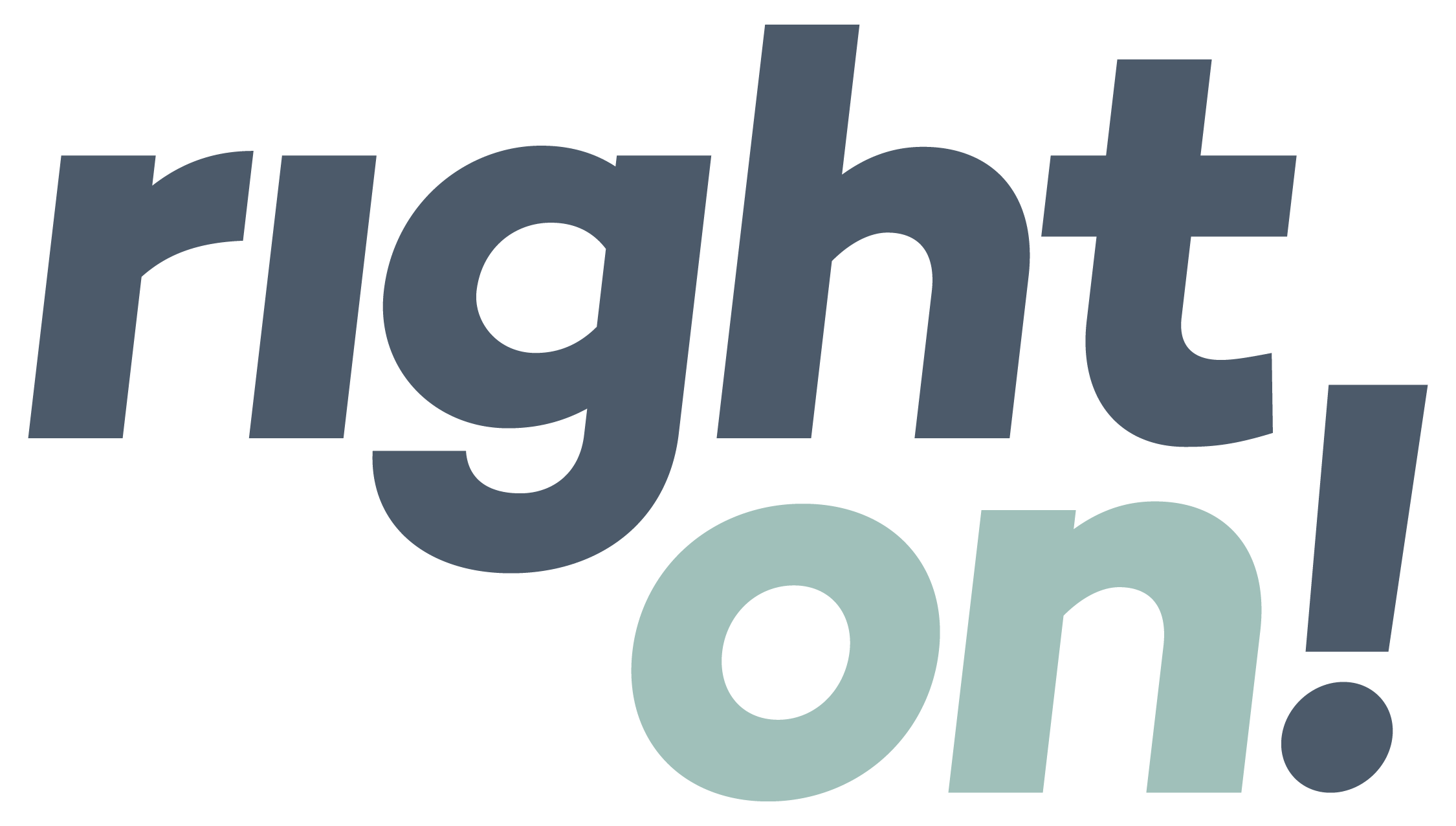
Inside the Right On recruiting process.
Our 18 interview questions and why they matter.
I wasn’t nervous on the first day of my first copywriting job. And … I absolutely should have been.
I had a Master’s in English and thought marketing copy would be a walk in the park—till my first doc came back covered with a maze of track changes and comments. The next doc looked the same, and pretty much every one after that. Because, as I learned to write squeaky-clean sentences, crisp headers, and clever sub-heads, the bar kept rising higher. Good writing could always be better.
As I progressed from junior writer to senior writer to ACD to CD, my humility grew proportionally. I learned to love internal reviews. And I learned that the true mark of a great senior writer was a commitment to improvement.
My future colleagues at Right On had learned the same. And today, as a writing-only agency, we’re incredibly specific about the kinds of writers we bring on. We seek not only senior writers who have already been put through their early paces, but they also need to adore honing their craft. In this environment, senior writers can refine their skills from expert levels to sheer science-backed artistry. It’s a beauty to behold, and the resulting copy is something that we’re not only proud of—it’s a consistent win for clients, too.
However, our high bar makes recruiting a time-intensive process. We love referrals and reach-outs from interested writers (keep ‘em coming!)—but once we’ve put a prospective writer’s portfolio in the much-better-than-good pile, we still hold an in-depth interview process to deem whether they might check all the boxes beyond great writing. Will they embrace and expand our agency culture? Are they organized almost to a fault? Are they fluent in B2B, adept at short-form, masters of long-form? Confident yet humble?
As researchers and thinkers, we love drilling down into details—which has yielded a series of interview questions we enjoy discussing with prospective writers. Far from interrogations, these discussions are, time and time again, delightful conversations with fellow professionals. We learn what makes them tick, what they love to do, how they like to work, and whether they, like us, order more books online than a human could read in an entire lifetime of desert island habitation.
In the interest of sharing—and hopefully drawing talented writers into our crew of sharp-thinking, fast-typing bibliophiles—here are the questions we ask.
- Are you fluent in B2B? We pride ourselves on handling techy and complex subjects while sounding human.
- Do you know the power of branded language? A great article or webpage also has to sound like it couldn’t have come from any other brand or publication.
- Can you think conceptually? We often need to develop strategic, creative solutions in partnership with other creatives or clients. And we need to nail it every time.
- Are you a natural-born researcher? We need writers who are voracious readers, researchers, and independent thinkers—who can confidently digest and assimilate information.
- Can you craft headlines? It’s really hard to make headlines look easy. But that’s what we’re here to do.
- Are you a “shoot for the moon” kind of person? The writing should be a 9/10 when you submit it internally. Our creative directors will help you get it to a shining 10/10 before submission to our clients.
- Do you have agency experience? While it’s not 100% required, it’s 100% desired. It helps if you’ve worked with a wide range of project types, team interactions, clients, and industries.
- Short-form, long-form, or all of the above? Sometimes we need a specialized short-form pinch hitter. Even more often, we need someone with long-form and/or journalistic writing experience. If 2,000+ words sounds approachable, good.
- Can you think tech and talk tech? Experience writing about technology and technical subjects is a big bonus. But it’s important that you can talk about tech in a way that goes beyond the dry expectations for traditional technical writing.
- Are you adept at interviewing? Many of our assignments require that we interview clients, partners, and subject matter experts for their invaluable input.
- Are you comfortable with clients? Soft skills are seriously important. Every email, phone call, presentation, and meeting is an opportunity to strengthen relationships, listen, share, and collaborate.
- Are you confident in your own skills? We love working with professionals who know their worth and show up motivated and keep calm under pressure.
- Are you a proactive problem-solver? Our writers need to be the personality types who propose solutions and make recommendations while also being willing to reach out to the team for input and help.
- Are you team-ready? There’s not a lot of lone-wolfing around here. Actually, everything we do is pretty darn collaborative. So if collaboration’s your cup of tea, we’ll make everything we do better, together.
- Do you have a growth mindset? … Which is another way of saying, “Do you love feedback?” Some writers dislike it at heart. But we lean into the feedback process, relishing the chance to consistently become better and stronger writers.
- Do you love being organized? Not every creative out there is super-organized. But ours are. We get the value of systems and processes. We’re precise with our deadlines, both internal and external. We deliver clean copy docs that follow style guides to a “t” and do so with carefully tracked sources.
- Are you a full freelancer or are you juggling a day job? Things work best with full-time freelancers who can collaborate and attend meetings and calls during the day as needed.
- Are you willing to embrace our platforms—and our clients’? We know, most freelancers end up with a lot of different logins. But it’s part of the job, both on our own project management platform of choice and our clients’ if they need us to.
That looks like a long list … and, it is. It’s because our writers are not only our greatest resource—they’re the source of what we offer. And, together, we’re all stronger through the power of our collective minds strategizing, reviewing, concepting, and improving.
So, while our interviewing and trial processes are rigorous, we offer our writers something intensely valuable in return: the freedom to truly practice their writing craft while letting our agency handle the project management, account management, billing, and internal reviews process. Here, freelancer writers can truly be writers without stressing the business particulars.
And while we’re letting writers be writers, we also offer mentorship and development opportunities that can be rare for senior copywriters. We’ve found that the best writers embrace our internal reviews and peer reviews, which are a fantastic opportunity to workshop our copy and find ways to make it better and better—even if it was good to start with. We hold monthly writing salons, too, to discuss writing- and freelancing-related topics that benefit our writers’ work.
And, while we hold high expectations, we all understand that every one of us is freelancing for a reason rather than dredging through the long hours and rigidity that come with most agency gigs. Nearly every one of our writers works from home, around the U.S. and beyond, scheduling their work hours around their life hours. Our team comprises working parents, backcountry adventurers, world travelers, fitness enthusiasts, and humanities junkies who love their work but make sure their work works for their lives.
Everyone keeps clear communication and does their part, and we lend each other a hand as needed to make sure we’re all living the Write On dream. We know it’s possible. Because every morning we pinch ourselves and think, “We’ve done it.”
Our Most Recent Insights.
SEE ALL INSIGHTS →
Strategy
Make the truth memorable.
The stories we tell, and how we tell them, can help keep trolls and untruths at bay.

Storytelling
Why science needs stories.
By combining data with stories, we make meaning from information.

Strategy
How to talk climate with conservatives.
Many conservatives care deeply about the environment. They just talk about it differently.
